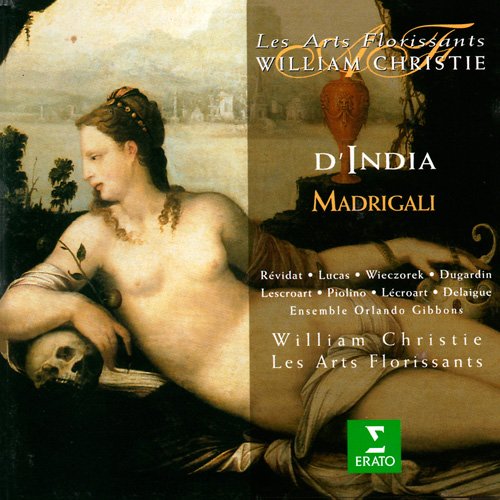
Les Arts Florissants & William Christie - D'India: Madrigali (1998)
BAND/ARTIST: Les Arts Florissants, William Christie
- Title: D'India: Madrigali
- Year Of Release: 1998
- Label: Erato
- Genre: Classical
- Quality: FLAC (image + .cue, log, artwork)
- Total Time: 64:49 min
- Total Size: 235 MB
- WebSite: Album Preview
Tracklist:
01. Libro III - "Merce!" grido, piangendo
02. Libro V - Voi dissi e sospirando
03. Libro VIII - Alme luci beate
04. Libro VIII - Io vi lascio, mie scorte
05. Libro V - Sospir che del bel petto
06. Libro I - Crud' Amarilli
07. Libro VIII - Se tu, Silvio crudel
08. Libro VIII - Ma se con la pieta
09. Libro VIII - Dorinda, ah! Diro "mia"
10. Libro VIII - Ferir quel petto, Silvio?
11. Libro VIII - Silvio, come son lassa
12. Libro III - "Lasso!", dicea Fileno
13. Libro III - Ombrose e care selve
14. Le Musiche Libro V - Ancidetemi pur, dogliosi affanni
15. Libro IV - Strana armonia d'amore
16. Libro IV - In cio sol differenti
17. Le Musiche Libro IV - Che veggio ohime, che miro?
18. Le Musiche Libro II - La mia Filli crudel
19. Le Musiche Libro II - Ecco Filli, mia bella
20. Libro III - Deh, chi mi fa languire
21. Crud' Amarilli
22. Piangono al pianger mio
23. Libro III - Quell' augellin che canta
01. Libro III - "Merce!" grido, piangendo
02. Libro V - Voi dissi e sospirando
03. Libro VIII - Alme luci beate
04. Libro VIII - Io vi lascio, mie scorte
05. Libro V - Sospir che del bel petto
06. Libro I - Crud' Amarilli
07. Libro VIII - Se tu, Silvio crudel
08. Libro VIII - Ma se con la pieta
09. Libro VIII - Dorinda, ah! Diro "mia"
10. Libro VIII - Ferir quel petto, Silvio?
11. Libro VIII - Silvio, come son lassa
12. Libro III - "Lasso!", dicea Fileno
13. Libro III - Ombrose e care selve
14. Le Musiche Libro V - Ancidetemi pur, dogliosi affanni
15. Libro IV - Strana armonia d'amore
16. Libro IV - In cio sol differenti
17. Le Musiche Libro IV - Che veggio ohime, che miro?
18. Le Musiche Libro II - La mia Filli crudel
19. Le Musiche Libro II - Ecco Filli, mia bella
20. Libro III - Deh, chi mi fa languire
21. Crud' Amarilli
22. Piangono al pianger mio
23. Libro III - Quell' augellin che canta
The Sicilian nobleman Sigismondo d'India was roughly contemporary with Monteverdi (both began their careers around 1600); the musical ferment of that period led, in d'India's case, to a very heady brew. His madrigals--duets, solos and five-voice works--are like inebriated Monteverdi: d'India set the Italian poetic texts (usually dealing with a lover's pain) with even less regard for academic counterpoint and even more surprising twists of harmony than did his more-famous colleague, yet the music never veers into the disorienting, seemingly willful weirdness of Gesualdo. William Christie and Les Arts Florissants have made occasional forays into the music of 17th-century Italy before, but their real turf is the French Baroque--and on this disc, it shows. The fast passagework is blurred; the vibrato (from the sopranos in particular), while not wide by modern operatic standards, is sufficient to smudge d'India's searing dissonances. Some of the solo singing is interesting and the ensemble and tuning are perfectly good, but this listener doesn't sense much passion. Oddly, several of the madrigals are played by an ensemble of viols. Performance by instruments rather than singers is historically plausible, but why use the famously sober viol family for such ardent music from the period when the violin family was just coming into its own? Les Arts Florissants certainly don't dishonor themselves here, but their work is far from the exalted standard they set in, say, Charpentier. If you want to know how dramatic d'India's music can be, let the Italian singers of Daltrocanto show you. -- Matthew Westphal
Related Releases:
Classical | FLAC / APE | CD-Rip
As a ISRA.CLOUD's PREMIUM member you will have the following benefits:
- Unlimited high speed downloads
- Download directly without waiting time
- Unlimited parallel downloads
- Support for download accelerators
- No advertising
- Resume broken downloads


